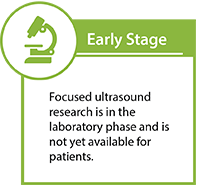Focused Ultrasound Therapy
Focused ultrasound is a noninvasive, therapeutic technology with the potential to improve the quality of life and decrease the cost of care for patients with inflammatory bowel disease, which includes both Crohn’s disease and ulcerative colitis. This novel technology focuses beams of ultrasound energy precisely and accurately on targets deep in the body without damaging surrounding normal tissue.
How it Works
Where the beams converge, focused ultrasound produces a neuromodulatory effect that stimulates the celiac plexus, with the goal of increasing the enteric cholinergic anti-inflammatory pathway. While significant preclinical work has been accomplished, there is still much to be done before this technology will be widely available.
Advantages
The primary options for treatment of inflammatory bowel disease include medication and or possibly invasive surgery.
For certain patients, focused ultrasound could provide a noninvasive alternative to surgery with less risk of complications – such as surgical wound healing and infection – at a lower cost. Focused ultrasound can reach the desired target without damaging surrounding tissue, and can also be repeated, if necessary.
Clinical Trials
At the present time, there are no clinical trials recruiting patients for focused ultrasound treatment of inflammatory bowel disease.
Regulatory Approval and Reimbursement
Focused ultrasound treatment for inflammatory bowel disease is not yet approved by regulatory bodies or covered by medical insurance companies.
Notable Papers
Akhtar K, Hirschstein Z, Stefanelli A, Iannilli E, et al. Non-invasive peripheral focused ultrasound neuromodulation of the celiac plexus ameliorates symptoms in a rat model of inflammatory bowel disease. Exp Physiol. 2021 Jan 29. doi: 10.1113/EP088848.
Click here for additional references from PubMed.

